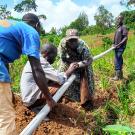This journal article on agricultural extension approaches that can better connect smallholder farmers and their existing soil knowledge with scientific concepts and novel practices was written by Lauren Pincus, Heidi Ballard, Emily Harris and Kate Scow of the University of California, Davis, as part of the Horticulture Innovation project focused on developing farmer-led irrigation solutions in Uganda.
The article, "Seeing below the surface: making soil processes visible to Ugandan smallholder farmers through a constructivist and experiential extension approach," was published in June 2018 in Agriculture and Human Values, which is the journal of the Agriculture, Food, and Human Values Society.
Abstract
Ugandan smallholder farmers need to feed a growing population, but their efforts are hampered by declining soil fertility rates. Agricultural extension can facilitate farmers’ access to new practices and technologies, yet farmers are understandably often hesitant to adopt new behaviors. New knowledge assimilation is an important component of behavior change that is often overlooked or poorly addressed by current extension efforts. We implemented a Fertility Management Education Program (FMEP) in central Uganda to investigate smallholder farmers’ existing soil knowledge and their assimilation of new scientific concepts into their knowledge framework. Qualitative data were collected through participant observation, farmer interviews, and focus groups, and coded for using a priori and emergent themes. Our exploration revealed some notable similarities between farmers’ soil knowledge and scientific concepts, particularly in regards to soil health concepts, a discovery that could facilitate communication between extension agents and farmers. However, certain scientific concepts are either unknown to farmers or discordant with existing soil knowledge; these concepts are unlikely to be assimilated by farmers without convincing and concerted extension efforts. Importantly, we found that the combination of new scientific knowledge and hands-on experimentation with novel practices gave farmers far greater confidence in implementing improved soil management practices. Our study provides evidence that extension programs should engage directly with farmers’ existing soil knowledge to develop their understanding of key biological concepts and confidence in implementing improved practices.
Pincus, L., Ballard, H., Harris, E. et al. Agric Hum Values (2018) 35: 425. doi:10.1007/s10460-017-9836-2
If you encounter problems accessing the full text of this journal article, you may contact one of the authors. The corresponding author can be contacted at lpincus@gmail.com.

